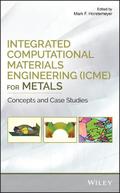Integrated Computational Materials Engineering (ICME) for Metals
Concepts and Case Studies

1. Edition May 2018
688 Pages, Hardcover
Wiley & Sons Ltd
Focuses entirely on demystifying the field and subject of ICME and provides step-by-step guidance on its industrial application via case studies
This highly-anticipated follow-up to Mark F. Horstemeyer's pedagogical book on Integrated Computational Materials Engineering (ICME) concepts includes engineering practice case studies related to the analysis, design, and use of structural metal alloys. A welcome supplement to the first book--which includes the theory and methods required for teaching the subject in the classroom--Integrated Computational Materials Engineering (ICME) For Metals: Concepts and Case Studies focuses on engineering applications that have occurred in industries demonstrating the ICME methodologies, and aims to catalyze industrial diffusion of ICME technologies throughout the world.
The recent confluence of smaller desktop computers with enhanced computing power coupled with the emergence of physically-based material models has created the clear trend for modeling and simulation in product design, which helped create a need to integrate more knowledge into materials processing and product performance. Integrated Computational Materials Engineering (ICME) For Metals: Case Studies educates those seeking that knowledge with chapters covering: Body Centered Cubic Materials; Designing An Interatomic Potential For Fe-C Alloys; Phase-Field Crystal Modeling; Simulating Dislocation Plasticity in BCC Metals by Integrating Fundamental Concepts with Macroscale Models; Steel Powder Metal Modeling; Hexagonal Close Packed Materials; Multiscale Modeling of Pure Nickel; Predicting Constitutive Equations for Materials Design; and more.
* Presents case studies that connect modeling and simulation for different materials' processing methods for metal alloys
* Demonstrates several practical engineering problems to encourage industry to employ ICME ideas
* Introduces a new simulation-based design paradigm
* Provides web access to microstructure-sensitive models and experimental database
Integrated Computational Materials Engineering (ICME) For Metals: Case Studies is a must-have book for researchers and industry professionals aiming to comprehend and employ ICME in the design and development of new materials.
2. Cast AM60 Mg Corvette Cradle
3. Extrusion of Front End AM30 Mg Crush Rail
4. Extrusion of AZ31 for Fatigue
5. Rolling of AZ3l Plate for Fatigue
6. Sheet Metal Forming of AZ31 Mg Pan
7. Rolled and then Stamped AZ31 Mg Side Door then Fatigued Under Crashworthiness
8. Friction Stir Welding Joint of Rolled AZ3l Plate Joined with AZ3l Plate
9. Cast AZ9l Front-End Demonstration Structure
10. Sequential Casting-Forming-Crash Simulations
11. Casting-Fatigue Sequence
12. Multiple Stage Forging Processing of a 316L Stainless Steel Alloy
13. Heat Treatment and Fatigue of a Multiphase Steel Alloy
14. Sequential Compaction-Sintering-Fatigue FC0205 Steel Alloy Simulations
15. Electronics to Atomistic Bridge Related to Mechanical Deformation
16. Electronics to Phases of Magnesium
17. Electronics to Phases of Iron Based Materials
18. Multiscale Study of Twinning in Magnesium
19. Atomistic Fatigue and Fracture of Mg
20. Microscale Phase Field Modeling of Mg Grain Growth
21. Mesoscale Crystal Plasticity Model to Macroscale Internal State Variable Plasticity-Damage Model
22. Simulating dislocation plasticity in BCC metals by integrating fundamental concepts and macroscale models
23. Cyberinfrastructure for Case Study Analyses
24. Summary


